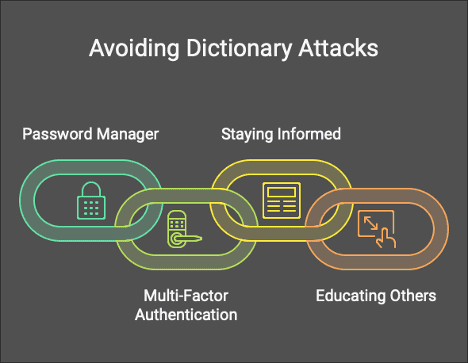Millions of people are at risk of their accounts being breached due to a weak password. Dictionary attacks are one of the simplest yet most effective tools a hacker may use. Using common words or phrases for passwords makes you vulnerable to dictionary attacks. Today, we’ll discuss exactly what these attacks are, how effective they are, and how you can avoid them.

What Is a Dictionary Attack?
Dictionary attacks use common words or phrases that a majority of people use for their passwords. Hackers will have huge lists and attempt to input every combination of these common words from their list to crack your password. A dictionary attack is a type of brute-force attack, where a hacker uses trial and error to crack passwords. However, there are key differences between the two:
Dictionary Attacks:
- Uses a predefined list of likely passwords
- Faster due to a limited set of guesses
- Efficient against weak, common passwords
- Relies on common patterns or wordlists
Brute-Force Attacks:
- Tries every possible password combination
- Slower due to longer work required
- Inefficient for long or complex passwords
- Requires no prior knowledge of the password
How Effective Is a Dictionary Attack?
These attacks have the potential to be very effective, especially when users prioritize convenience over security. Sometimes using the same password for every platform they use. A Google Online Security Survey showed that 13% reuse the same password for all accounts, and 52% reuse the same password for multiple accounts. 13% may not sound like a lot, but search engines such as Google have around 85.2 billion visits each month. Here are some reasons why dictionary attacks work:
Data Breaches: Reusing passwords poses a significant risk. All it takes is a cybercriminal to get your information from a single data breach and they may compromise any account associated with that information. Tools like haveibeenpwned.com can help you identify if any of your data has been compromised.
Easy To Crack: Common passwords such as password, 123456, qwerty, or 1234 are easily guessed. For instance, in 2012, Dropbox had over 68 million user credentials exposed from a dictionary attack. An employee had the same password for their LinkedIn and their corporate account. This shows that even industry giants can be susceptible to these attacks.
Domino Effect: Once one password is compromised, it can lead to a chain reaction where attacks gain access to any account with that password. This domino effect makes dictionary attacks particularly dangerous.

Photo by Statista
How To Avoid Dictionary Attacks
While dictionary attacks can be effective, they can also be easily preventable. Here are some strategies to safeguard your accounts:
Use a Password Manager: Password managers are an encrypted place to store all of your sensitive passwords. They can help create strong passwords, store everything in one location, and make sure no one except you can access them. At Kirkham IronTech we use password managers to share passwords safely across teams, reducing the hassle of manual sharing.
Use MFA: Multi-factor authentication requires users to provide more than one verification factor to gain access to something. Using MFA increases your chances significantly of not getting breached by cyberattacks. We at Kirkham IronTech provide MFA/2FA services for businesses and many other proactive measures to ensure our clients stay protected.
Stay Up to Date with Breaches: It’s important to stay updated on cybersecurity news. There are several cybersecurity newsletters that can help you identify some of the biggest breaches you may find yourself in. Follow our CyberScoop Weekly on LinkedIn for weekly blogs about everything cybersecurity.
Educate Others: Educating others is one of the best ways to mitigate a dictionary attack. Teaching them to use passwords longer than at least 12 characters, using special characters, and a unique one for each platform is crucial to stay safe. It may seem tedious but protecting your data is the best thing for your and your business’s continued security.

Staying Safe from Dictionary Attacks
These attacks may seem simple on the surface, but millions of user data has been exposed due to them. By understanding what they are, recognizing their effectiveness, and implementing the strategies discussed, you can protect yourself and your business from these threats. Something as small as having a unique password for each site can end up saving you in the long run.
At Kirkham IronTech, our goal is to protect our clients’ businesses from attacks such as these. With our team of experts, we ensure that no one can steal the data from our clients.
Don’t Become a Victim of Dictionary Attacks, Call Us Today!
Call Us: (479) 434-1400 – Get in touch with our team.
Visit Our Website: www.kirkhamirontech.com – Learn more about our services.
Email Us: info@kirkhamirontech.com – Let us know how we can protect you and your business.

 Tom Kirkham brings more than three decades of software design, network administration, and cybersecurity knowledge to organizations around the country. During his career, Tom has received multiple software design awards and founded other acclaimed technology businesses.
Tom Kirkham brings more than three decades of software design, network administration, and cybersecurity knowledge to organizations around the country. During his career, Tom has received multiple software design awards and founded other acclaimed technology businesses.
